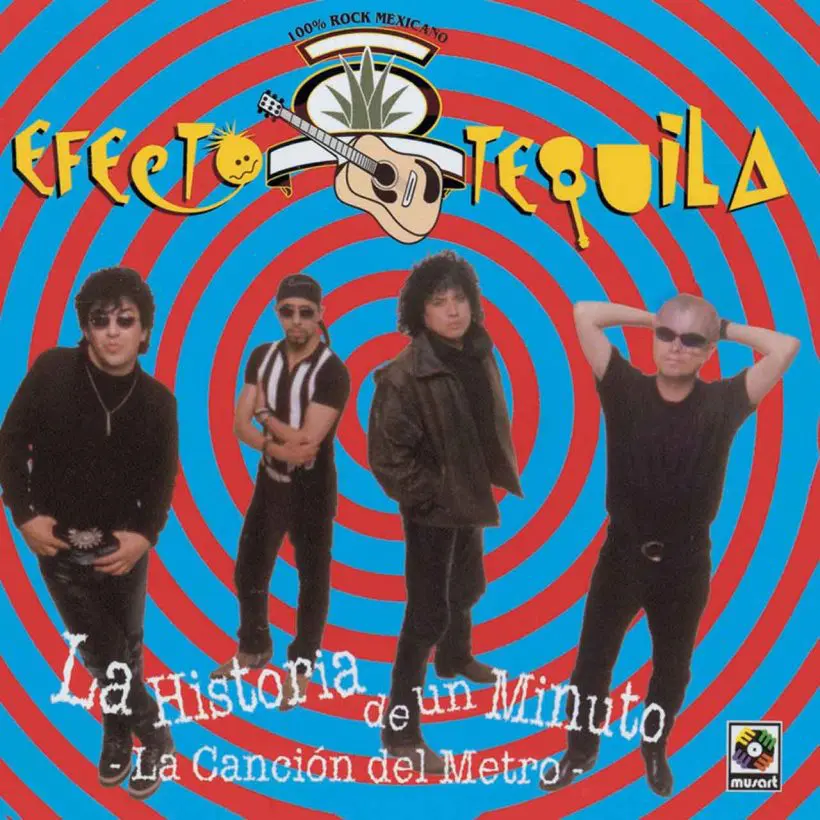‘La Historia de un Minuto’: Efecto Tequila’s Unlikely Triumph
How the famed song came to be recorded is a tale as long and winding as Mexico City’s subway system.

In Mexico City in the early 1980s, metro riders were sometimes lucky enough to be part of David Garnica Palomares’ captive audience. Dressed in black beneath a mane of wild black hair, Garnica played guitar and harmonica and sang to the rush-hour crowd on public transit, his only choice at a time when clubs where unknown rockers like him could perform were few. Busking in the train cars, he’d launch into “La historia de un minuto,” which literally became an underground hit, so much so that other metro musicians began to perform it.
Those who heard the tune would find themselves whistling as they headed out to the street. “La historia de un minuto,” which Garnica himself would start and end by whistling, is the kind of song that makes your day seem better just for having heard it. Catchy from the first line, “Ella convirtio, la noche en un poema de amor…” (“She converted the night into a love poem”), it became known as “the metro song.”
Listen to Efecto Tequila’s La Historia de un Minuto now.
Garnica and his brother Oswaldo performed together in the metro, usually playing their repertory of songs by The Beatles, The Doors, Elvis, and The Kinks, which David sang in English. They only played one original song. That one. He called it “the metro anthem.” The Garnicas and some friends formed a band called Los Traviesos. The group started playing around the city at clubs and fairs, although they could still be spotted in a crowded metro car. One story about them was headlined “Pop Group in Search of Fame and Fortune.” They never found it. The band recorded a four-song EP for WEA Mexico in 1988. It did not include “La historia de un minuto.”
About a decade after Garnica first played “La historia de un minuto” in the metro, it did become a hit. But it was another band that recorded the song, the Mexican rock band Interpuesto. The group’s hard-rocking 1994 cover of Garnica’s song became a calling card for that band, propelling their popularity around Mexico and other Latin American countries. When Garnica heard the song, he asked for and was denied his author’s credit and payment from the record label. He eventually was able to prove his copyright and negotiate his proper credit as the composer.
By this time, Garnica and members of Los Traviesos had formed a new group. Efecto Tequila (“the Tequila effect”) was named for the impact of a financial crisis that brought the Mexico economy down in the mid-nineties. The band’s signing with the Mexican label Musart took place after Garnica had attracted attention when he emerged as the true author of “La historia de un minuto.” The group’s 1998 album was titled La Historia de un Minuto: La Canción del Metro.
“In your hands is the result of an effort of many years, against all the odds and in spite of it all, to get people to value our concerns and value what we had to say,” reads a message from the band inside the original CD. “We took refuge in the metro to satisfy the hunger in our stomachs and the thirst that comes from struggling in vain. In a moment of crisis, the metro opened its doors to us and the thousands of riders on the 2 and 3 lines became our accomplices and created a platform for us to search for a new opportunity. Today we want to dedicate this album to them, for singing ‘La historia de un minuto’ along with us…”
As the opening song of the album, Efecto Tequila’s freewheeling version of “La historia” confirms why it became such a crowd pleaser. Featuring Garnica’s trademark whistling and harmonica, the bluesy jam is a two-and-a-half-minute joyride.
The album includes nine other songs that are a sign of what were powerful times for rock en español. By the late nineties, rock in Latin America had evolved into a flourishing movement that crossed through countries called “rock en tu idioma” (rock in your language), spreading the distinctive sound of Latin rock, and proving that rock and the sentiments it expressed did not have to be in English to be authentic. Groups like Caifanes and El Tri had ushered in an era of stadium shows for Spanish-language rock groups in Mexico. Efecto Tequila confidently rode in their wake on songs like “Maldiciendome” and “Lo intenté.”
The influence of Argentine band Soda Stereo, which in the 1980s toured throughout the region to become the first Latin American supergroup with their emotive power pop songs, is clear on Efecto Tequila tracks like “Tengo que escaper” and “Dondé estás.” The band also delivers lighter-waving rock ballads (“No te marches de aquí”). On the bouncy track “Contigo,” Garnica comes closest to his days as a transit system cantautor, opening with acoustic guitar and ending the song with a familiar whistle. The band closes the album with some grooving dancefloor soul on “Sitiados”.
Garnica died in 2010, a time when the cd and cassette copies of Efecto Tequila’s album were becoming rare collectors’ items among Mexican rock fans, and the “metro song” was just a memory in the minds of commuters who had first heard Garnica play it. With the album’s re-release, the song lives on.












